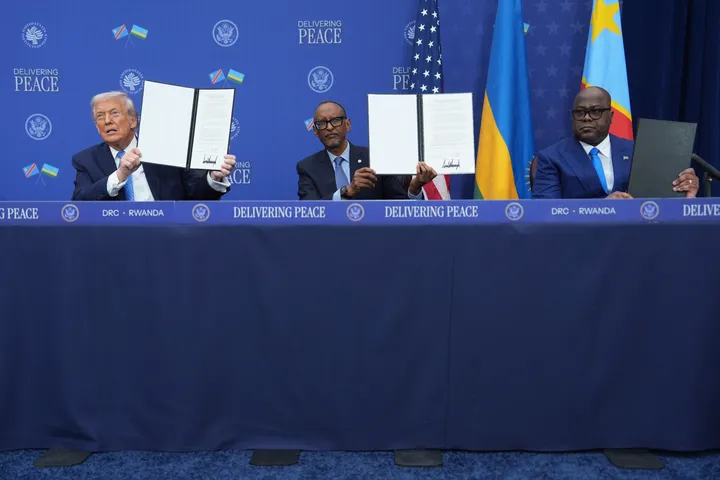By Yahya Habil
The Africa Cup of Nations is perhaps Africa’s most prestigious sports competition. However, in spite of that, low turnout and attendance rates at stadiums have been a recurring theme across all AFCON editions.
With the 34th edition of the competition starting in Côte d'Ivoire, many suspect that this phenomenon might continue.
The reasons for this phenomenon range from infrastructural issues to financial, political, and socio-cultural ones.
Infrastructural issues revolve around the fact that many African countries do not have the suitable and required infrastructure to attract tourists and football fans from all over the continent.
African countries are not linked by railway lines, which could ease travel and offer connectivity. Thus, Africans have no choice but to take flights to host countries. This is where financial issues come into play, as flight tickets are usually quite expensive for the average African.
For instance, if an Algerian would want to travel to the Côte d'Ivoire for the upcoming AFCON, a week roundtrip would cost a minimum of around 146,000 Algerian Dinars. The minimum wage in Algeria as of 2023 is 20,000 DZD/month.
Aside from the aforementioned factors, it is worth mentioning that socio-cultural factors in the form of collective perception also play a role.
Socio-cultural impediments
Usually, many Africans rarely travel to other African countries different from theirs. This is due to the continent’s geography and infrastructure, but it also has to do with the issue of visa restrictions.
A 2018 report by the African Union found that Africans can travel without a visa to just 22% of other African countries. Six years later, this statistic is still not off the mark. Therefore, an Algerian would not know much about Côte d'Ivoire as much as a Brazilian would know about Paraguay or Ecuador in Latin America.
Moreover, due to the fact that the continent regularly suffers from political instability and economic challenges, negative perceptions and misconceptions usually accumulate. As a result, this leads even the financially capable African to be unmotivated to travel behind their national team.
When the tournament was hosted by a specific country, the people of the neighbouring, familiar countries would travel and show up to support their national team.
The best example for this is also quite a recent one. In the 2019 AFCON in Egypt, the final between Algeria and Senegal saw an attendance of 25,000, the highest recorded in the tournament when not factoring in the Egyptian national team’s fixtures. The majority of those 25,000 supporters were Algerians, who are a people that are very familiar with Egypt and come from a fellow North African and Arab nation.
To verify this hypothesis, one can look at the Algerian attendance when the tournament was moved to Cameroon three years later. Barely any Algerian supporters attended the tournament.
It is true that the reason many Algerians flocked to Egypt in 2019 was due to their national team’s success in reaching the final. However, it is highly unlikely that the same would’ve occurred had Algeria reached the final in the edition held in Cameroon.
When such factors prevent African football fans from traveling behind their national teams across the continent, this leaves only the local people of the host country to be available for attendance at the tournament, and usually, the people of the host country mostly turnout to watch their national team.
Once again, a recent example of this was the 2019 AFCON in Egypt, where the Egyptian national team’s matches saw crowds of more than 70,000 attend, whereas most of the other games saw less than 10,000 spectators, with an average of 5,000 according to Africanews.
Ticket prices
However, ticket pricing also presents an issue and further fragments the number of people who could attend the games, as many locals cannot afford tickets to fixtures.
According to the Nigerian Guardian newspaper, tickets at Egypt’s 2019 AFCON were sold for between 4,300 and 53,700 Nigerian naira for Egypt games and between 2,150 and 10,740 naira for other games in a country where the minimum wage is 62,292 Naira.
In short, infrastructural, political, administrative, financial, and even socio-cultural issues present obstacles towards attracting football fans from all across the continent during the AFCON.
This singles out the host population as the only available audience for tournament’s matches. However, ticket pricing does not allow for all classes of the host population’s society to attend the games.
This situation might persist as the 34th edition of AFCON takes place.
Turning this around would require a huge shift in the continent’s infrastructure and quality of life, which is unlikely in the near future. However, the reduction of flight and match ticket prices could see well attended, more vibrant and lively AFCON.
The author, Yahya Habil, is a Libyan freelance journalist focusing on African affairs. He is currently working with a think tank in the Middle East.
Disclaimer: The views expressed by the author do not necessarily reflect the opinions, viewpoints and editorial policies of TRT Afrika.
➤Click here to follow our WhatsApp channel for more stories.
























